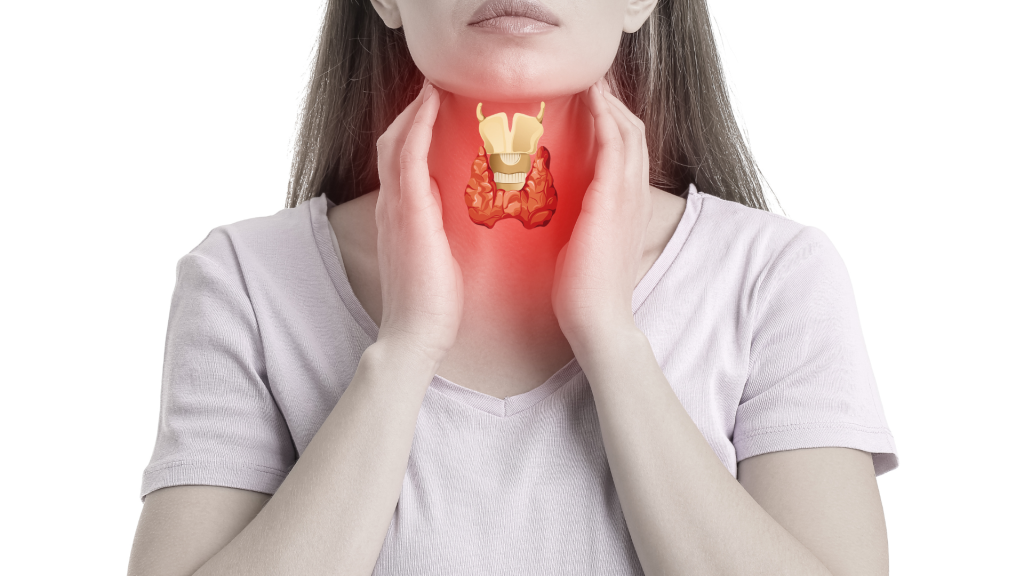Thyroid Disorders
Home - Thyroid Disorders
Thyroid disorders have become increasingly prevalent in the United States, affecting energy production and metabolism regulation. It is important to gain clarity on these conditions as they continue to rise. There are two primary types of thyroid disorders:
Hypothyroidism (Hashimoto’s)
Hypothyroidism occurs when the body fails to produce sufficient thyroid hormone, leading to a lack of energy production. The two main thyroid hormones are T4 and T3, with T3 being the active form that the body primarily utilizes. Hypothyroidism can stem from various causes:
- Underproduction of T4 and T3: This can occur due to a deficiency of the mineral iodine, which is commonly found in seafood and kelp. Unfortunately, the American diet is often deficient in iodine, and exposure to chemicals like fluoride, chlorine, and bromine further depletes iodine levels. These chemicals compete with iodine for receptors in the body, hindering the production of thyroid hormones.
- Liver Congestion/Fatty Liver/Cirrhosis (Conversion issue): The liver plays a crucial role in converting T4 to T3. If the liver is damaged or not functioning optimally, the conversion process is impaired, resulting in an inadequate supply of T3. Even individuals taking synthetic thyroid hormones may continue to experience symptoms if the underlying issue lies within the liver.
- Communication issues/damage to the hypothalamus or pituitary gland: Thyroid issues are not always directly related to the thyroid gland itself. The hypothalamus and pituitary gland play key roles in instructing the thyroid. Disruptions in communication among these structures can lead to thyroid problems. The hypothalamus, located in the brain, produces hormones that direct the pituitary gland, which, in turn, controls the thyroid. Any disruption in this chain can result in a thyroid issue.
- Selenium Deficiency (Conversion issue): Selenium, a trace mineral found in various foods, is essential for converting T4 to T3. Deficiencies in selenium can occur due to inadequate consumption, poor digestion, or genetic predisposition.
- Toxic Exposure: Living in the modern world exposes individuals to a range of chemicals through water, food, and air. Heavy metals, such as mercury and aluminum, tend to accumulate in organs and glands, including the thyroid. The immune system may attack the thyroid tissue when foreign substances are present, leading to inflammation and conditions like Hashimoto’s thyroiditis.
Hyperthyroidism (Grave’s)
Hyperthyroidism, although less common than hypothyroidism, shares similar underlying causes:
- Overproduction of T4 and T3: Excessive thyroid hormone production can result from various factors.
- Liver Congestion/Fatty Liver/Cirrhosis: Impaired liver function can contribute to hyperthyroidism, affecting hormone conversion.
- Communication issues/damage to the hypothalamus and pituitary gland: Disruptions in the communication chain involving the hypothalamus and pituitary gland can cause hyperthyroidism.
- Toxic Exposure: Similar to hypothyroidism, toxic exposure, particularly to heavy metals, can trigger immune system responses that target the thyroid tissue.
Comprehensive Approach to Thyroid Disorders
Regardless of whether an individual presents with hypothyroidism or hyperthyroidism, a comprehensive approach is crucial to address the underlying causes rather than simply managing symptoms indefinitely. It is essential to investigate the specific reasons behind the thyroid issue and focus on addressing the root cause.

Chiropractic Care & Treatment for Spine Health
While chiropractic care specializes in treating pain in the neck, back, muscles, and joints, it also plays a significant role in promoting wellness. Chiropractic adjustments, including spine health, posture alignment, subluxation treatment, disc pain relief, vertebrae manipulation, extremity mobilization, and injury rehabilitation, can support overall well-being and complement thyroid disorder management.
Contact Us for Chiropractic Care & Treatment
To learn more about how Chiropractic Care & Treatment can assist you in managing thyroid disorders and living a healthier life, contact us today at (623) 294-6564 or fill out the form for a free consultation. Our dedicated team is here to help everyone in the community achieve their best health and well-being.

